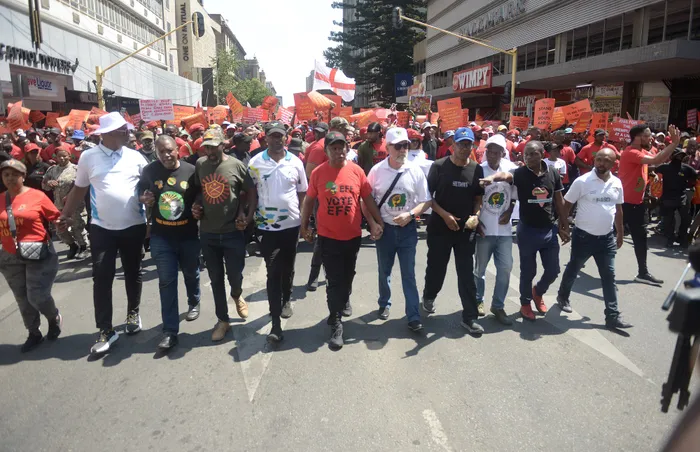‘Opportunistic’ political tactics heaps pain on economy, workers

Picture: Thobile Mathonsi – Members of the EFF gather at Church Square during the National Shutdown on Monday, March 20, 2023. Did EFF leader Julius Malema deliberately choose March 20 to opportunistically pretend that the many people who chose to give themselves a four-day weekend had done so to support its national shutdown? the writer asks
By Bonke Dumisa
The EFF chose March 20 as the day of its national shutdown. An interesting observation about the choice of date is that it fell on Monday, a day before the Human Rights Day public holiday, which some refer to as Sharpeville Day.
Everyone knows that whenever a public holiday falls on a Tuesday or Thursday, many South Africans usually take annual leave on the Monday or Friday to give themselves a four-day weekend. Did EFF leader Julius Malema deliberately choose March 20 to opportunistically pretend that the many people who chose to give themselves a four-day weekend had done so to support its national shutdown?
Malema and his EFF wanted to bring everything to a standstill in South Africa, especially the economy, as a means of attaining a particular political goal. The party said it wanted to highlight the problems of loadshedding, unemployment, the rising cost of living and, most importantly, to push for Cyril Ramaphosa to step down as president of the country.
Section 17 of the Constitution of South Africa allows everyone the right to, peacefully and unarmed, assemble, demonstrate, picket and present petitions. The EFF and its many allies thus had all the right to assemble and carry their placards as they did on Monday.
Section 18 goes on to say everyone has the right to freedom of association. The direct implication of the constitutional provision is that people or businesses who wanted to associate themselves with the EFF’s national shutdown had the right to do so.
But, by the same token, people and businesses who did not want to associate themselves with it had the right not to be forced to stay away from work, and businesses not to close on March 20. It is against the background of Section 18 that many people and businesses who did not want to be forced to participate in the shutdown approached the national government and/or provincial governments to ensure that their constitutional right to disassociate themselves from it was respected.
Section 36 of the Constitution is popularly known as the limitation of rights clause. It states that the rights enshrined in the Constitution may be limited in terms of general application to the extent that the limitation is reasonable and justifiable in an open and democratic society based on human dignity, equality and freedom, taking into account all relevant factors, including the nature and the importance of the purpose of the limitation, the nature and extent of the limitation, and the relation between the limitation and its purpose.
It is precisely against this background that the national government and provincial governments ensured there was optimum visibility of the police and the soldiers on March 20. It is precisely because of the precautionary steps that were taken by the provincial and national governments that some businesses were able to operate normally that day.
But many businesses in black areas remember well what happened during the economic sabotage mayhem of July 2021, when many businesses were looted and destroyed willy-nilly, without police intervention. It is against this background that many other businesses decided to close, after being threatened to do so either directly or indirectly.
Putco buses were scheduled to operate normally on the day, but they were stoned in Soweto and one of them was hijacked, therefore Putco stopped all its buses from operating. It is suspected that some Putco bus drivers were involved in making sure the buses didn’t operate, for obvious reasons that they would be paid for Monday without working.
Who are the victims of this national shutdown? All of us. The economy is fragile, having had a gross domestic product negative growth rate of -1.3 percent in the fourth quarter of last year; the national shutdown might add to a possible negative GDP economic growth rate in the first quarter of this year.
Two consecutive-negative quarterly growth rates result in a technical recession, which will mean more hardships for South Africans. When that happens, we must remember that Malema and the EFF were proud of themselves on March 20, for successfully sabotaging the economy on the day; and that many poor black workers did not get paid that day because of the no work no-pay policy, whereas the politicians who instigated that loss would have been paid for the day.
Prof Bonke Dumisa is an independent economic analyst